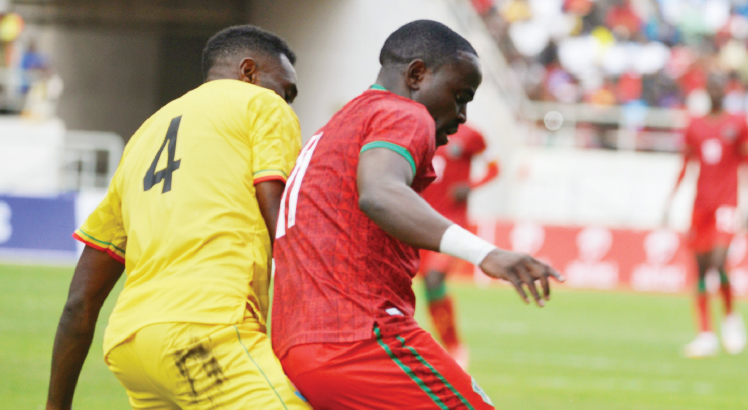Chrissy Lindisoni of Kanseche Village in Chikwawa District was on the cusp of dropping out of school in January due to an unintended pregnancy.
The 17-year-old girl rues losing her condoms to severe floods when Tropical Storm Ana displaced all 2 380 people in her village in Traditional Authority (T/A) Lundu.
The displaced community took shelter at an unsanitary, congested camp in Dala Village, T/A Maseya.
The three-day rainstorm displaced 190 000 people from the affected one million in 16 southern districts, according to Department of Disaster Management Affairs.
Some of the women who benefitted from the intervention
It ripped 505 homes in Kanseche when the heavily silted Mwanza River broke its banks
“Most of us survived only with the clothes we wore the night tragedy struck. I fled to safety around 9pm when our home was shattered. My clothes, books, and condoms were gone,” says the Standard Five girl at Mwanza Primary School.
Chrissy had her first sexual encounter aged 15, shortly after undergoing the traditional initiation rite.
“As part of the initiation to adulthood, we were trained in ways to satisfy a man in bed, so I wanted to try it out,” she explains.
Early sex debuts fuel teen pregnancy and child marriages in the country. According to the Malawi Demographic and Health Survey of 2015, nearly half of Malawian girls marry before their 18th birthday and a third fall pregnant before reaching 19.
Chrissy trusted condoms to protect her from unwanted pregnancies, early marriage and sexually transmitted infections (STIs), including HIV.
“I know the dangers of unprotected sex. I don’t want to ruin my health and chances in life,” states the girl with an early exposure to sexual and reproductive health (SRH) services and information.
But she lost a grip on her sexual and reproductive health when the floods uprooted her from home to the camp where she continued exploring her sexuality.
Faced with the risk of unprotected sex in the congested camp, she twice walked to Bereu Health Centre to get her preferred contraceptive method, but the facility stopped providing health services for two weeks having been hit hard by floods. Floodwaters damaged vital health supplies and equipment.
The halt caused panic among sexually active adolescents and married partners.
When tragedy struck, Chrissy Fachi, 41, was counting down to the expiry of the third month of a discreet, injectable contraceptive preferred by the majority of Malawians.
“I was about to renew it on January 28. The disruption in health services left me at risk because any sexual encounter could have led to an unwanted pregnancy,” the mother of six recalls:
For five months, Kanseche Camp at Dala did not record any teen pregnancy.
Chrissy and Fachi attribute the clean sheet to mobile clinics supported by Family Planning Association of Malawi’s (Fpam) to sustain flood survivors’ access to sexual and reproductive health.
Fpam in partnership with Chikwawa District Hospital intensified emergency mobile clinics to 72 camps in the worst-hit district with funding from the United Nations Population Fund (UNFPA) and International Planned Parenthood Federation.
The mobile clinics guaranteed the survivors’ easy access to integrated SRH, HIV testing and treatment, cervical cancer screening and general medical care.
The intervention provides sexually active girls, boys and parents with assorted contraceptive methods.
This is in line with Malawi’s Nairobi promise to make sexual and reproductive health part of its disaster response. The country announced the commitment at the International Conference on Population and Development (ICPD) held in Kenya’s capital in November 2019.
The arrival of a van carrying medical supplies and staff personifies the fulfillment of the ICPD promise in recognition of the muted reality that sexual encounters do not stop during disasters.
Chrissy and Fatchi says the emergency outreach restored her peace of mind.
“I rushed at first call, and got Depo-Provera injection and condoms. These help me to have safe sex while I focus on my education to have a bright future,” says the teen girl.
Kanseche Camp secretary Pilirani Mailosi says access to modern family planning methods has averted numerous teen pregnancies, allowing girls like Chrissy to stay in school and protect their dreams while recovering from the disaster.
“The mobile clinic has saved sexually active young people from unprotected sex and STIs. This has helped keep girls in school as they hope to break the vicious cycle of poverty and social exclusion,” he explains.
Mable Pirimita, senior community-based nurse at Chikwawa District Hospital, says the mobile clinics complemented their efforts to reach more survivors with vital health services.
Fpam communications and advocacy officer Faith Kadzanja says survivors’ right to health transcend the disasters which have become more frequent and devastating due to climate change.
“We are committed to ensuring people have uninterrupted access to SRH services so that young ones make informed decisions about their bodies and future while parents have children they can manage to look after,” she says. n
The post Taking SRH services to camps appeared first on The Nation Online.
 Moni Malawi
Moni Malawi 

